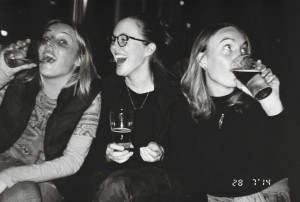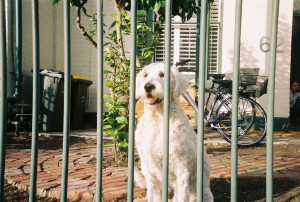Whole Foods is like Vegas. You go there to feel good but you leave broke, disoriented, and with the newfound knowledge that you have a vaginal disease.
Unlike Vegas, Whole Foods’ clientele are all about mindfulness and compassion… until they get to the parking lot. Then it’s war. As I pull up this morning, I see a pregnant lady on the crosswalk holding a baby and groceries. This driver swerves around her and honks. As he speeds off I catch his bumper sticker, which says ‘NAMASTE’. Poor lady didn’t even hear him approaching because he was driving a Prius. He crept up on her like a panther.
As the great, sliding glass doors part I am immediately smacked in the face by a wall of cool, moist air that smells of strawberries and orchids. I leave behind the concrete jungle and enter a cornucopia of organic bliss; the land of hemp milk and honey. Seriously, think about Heaven and then think about Whole Foods; they’re basically the same.
The first thing I see is the great wall of kombucha — 42 different kinds of rotten tea. Fun fact: the word kombucha is Japanese for ‘I gizzed in your tea.’ Anyone who’s ever swallowed the glob of mucus at the end of the bottle knows exactly what I’m talking about. I believe this thing is called “The Mother,” which makes it that much creepier.
Next I see the gluten-free section filled with crackers and bread made from various wheat-substitutes such as cardboard and sawdust. I skip this aisle because I’m not rich enough to have dietary restrictions. Ever notice that you don’t meet poor people with special diet needs? A gluten intolerant house cleaner? A cab driver with Candida? Candida is what I call a rich, white person problem. You know you’ve really made it in this world when you get Candida. My personal theory is that Candida is something you get from too much hot yoga. All I’m saying is if I were a yeast, I would want to live in your yoga pants.
Next I approach the beauty aisle. There is a scary looking machine there that you put your face inside of and it tells you exactly how ugly you are. They calculate your wrinkles, sun spots, the size of your pores, etc. and compare it to other women your age. I think of myself attractive but as it turns out, I am 78 percent ugly, meaning less pretty than 78 percent of women in the world. On the popular 1-10 hotness scale used by males the world over, that makes me a 3 (if you round up, which I hope you will.) A glance at the extremely close-up picture they took of my face, in which I somehow have a glorious, blond porn mustache, tells me that 3 is about right. Especially because the left side of my face is apparently 20 percent more aged than the right. Fantastic. After contemplating ending it all here and now, I decide instead to buy their product. One bottle of delicious smelling, silky feeling creme that is maybe going to raise me from a 3 to a 4 for only $108 which is a pretty good deal when you think about it.
I grab a handful of peanut butter pretzels on my way out of this stupid aisle. I don’t feel bad about pilfering these bites because of the umpteen times that I’ve overpaid at the salad bar and been tricked into buying $108 beauty creams. The pretzels are very fattening but I’m already in the seventieth percentile of ugly so who cares.
Next I come to the vitamin aisle which is a danger zone for any broke hypochondriac. Warning: Whole Foods keeps their best people in this section. Although you think she’s a homeless person at first, that vitamin clerk is an ex-pharmaceuticals sales rep. Today she talks me into buying estrogen for my mystery mustache and Women’s Acidophilus because apparently I DO have Candida after all.
I move on to the next aisle and ask the nearest Whole Foods clerk for help. He’s wearing a visor inside and as if that weren’t douchey enough, it has one word on it in all caps. Yup, NAMASTE. I ask him where I can find whole wheat bread. He chuckles at me “Oh, we keep the poison in aisle 7.” Based solely on the attitudes of people sporting namaste paraphernalia today, I’d think it was Sanskrit for “go fuck yourself.”
I pass the table where the guy invites me to join a group cleanse he’s leading. For $179.99 I can not-eat not-alone… not-gonna-happen. They’re doing the cleanse where you consume nothing but lemon juice, cayenne pepper and fiber pills for 10 days, what’s that one called again? Oh, yeah…anorexia. I went on a cleanse once; it was a mixed blessing. On the one hand, I detoxified, I purified, I lost weight. On the other hand, I fell asleep on the highway, fantasized about eating a pigeon, and crapped my pants. I think I’ll stick with the whole eating thing.
I grab a couple of loaves of poison, and head to checkout. The fact that I’m at Whole Foods on a Sunday finally sinks in when I join the end of the line…halfway down the dog food aisle. I suddenly realize that I’m dying to get out of this store. Maybe it’s the lonely feeling of being a carnivore in a sea of vegans, or the newfound knowledge that some people’s dogs eat better than I do, but mostly I think it’s the fact that Yanni has been playing literally this entire time. Like sensory deprivation, listening to Yanni seems harmless at first, enjoyable even. But two hours in, you’ll chew your own ear off to make it stop.
A thousand minutes later, I get to the cashier. She is 95 percent beautiful. “Have you brought your reusable bags?” Fuck. No, they are at home with their 2 dozen once-used friends. She rings up my meat, alcohol, gluten and a wrapper from the chocolate bar I ate in line, with thinly veiled alarm. She scans my ladies acidophilus, gives me a pitying frown and whispers, “Ya know, if you wanna get rid of your Candida, you should stop feeding it.” She rings me up for $313. I resist the urge to unwrap and swallow whole another $6 truffle in protest. Barely. Instead, I reach for my wallet, flash her a quiet smile and say, “Namaste.”
Click here to read the original post




